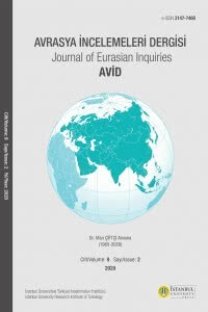RUSYA KAMU YÖNETİMİNDE ETİK KONULARINA BAKIŞ: HUKUKİ-NORMATİF VE SÖYLEM İÇERİK ANALİZİ
Russian Public Administration, Public Servant, Bureaucracy, Public Service Ethics Corruption.,
___
n Конституция Российской Федерации, 12 декабря 1993 г, [Rusya Federasyonu Anayasası, 12 Aralık 1993], http://constitution.kremlin. ru/ (Erişim tarihi: 16.09.2013) n “Типовой кодекс этики и служебного поведения государственных служащих Российской Федерации и муниципальных служащих”, [“Rusya Federasyonu Kamu Yerel Yönetim Hizmetlilerinin Mesleki Davranış ve Etiği Kodu”] 23 Aralık 2010, http://www.gov.karelia.ru, (Erişim tarihi: 16.09.2013) n LEDENEVA Alena, “Can Medvedev, Change Sistema? Informal Networks and Public Administration in Russia”, (ed. Vadim Kononeko, Arkady Moshes), Russia as a Network State: What Works in Russia When State Institutions Do Not?, Palgrave, New York 2011, s.39-62 n İVANOV M., Sergei, “Çağdaşlaşma Sürecinde Rusya’nın ve Türkiye’nin Yazgılarındaki Benzerlik Üzerine, (18. Yüzyıl - 20. Yüzyılın Başları)”, (Çev. Bülent Duru), Ruşen Keleş’e Armağan, VI. Kitap: Demokrasi ve Politika, Der. Ayşegül Mengi, İmge, Ankara, 2007, s. 433-444 n Russia, Building Rules For The Market, OECD Reviews of Regulatory Reform, Paris 2005 n DAĞI, Zeynep, Kimlik, Milliyetçilik ve Dış Politika: Rusya’nın Dönüşümü, Boyut 2002. n Б. А. Исаев, Н. А. Баранов, Политические Отношения И Политический Процесс В Современной России, Питер 2008. [B.A.İsaev, N.A. Baranov, Political Relations and Political Process in Modern Russia, Piter 2008]. n В.П. Мельников, Государственная Служба В России: Исторический Опыт, Мocквa 2005. [V. P. Melnikov, Public Service In Russia: Historical Experience, Moscow 2005]. n Л. П. Абрамова, Курс Лекций По Этике, Санкт – Петербург 2001. [L.P. Abramova, Course of Lectures on Ethics, Petersburg 2001]. n РАГС, Нравственные Основы Государственной Службы России, Мocквa 2003. [RAGS, Moral Foundations of the Public Service of Russia, Moscow 2003]. n Р.Г. Пихои, История Государственного Управления В России, Мocквa 2002. [R.G. Pikhoi, The History of Public Administration in Russia, Moscow, 2002]- Yayın Aralığı: Yılda 2 Sayı
- Başlangıç: 2012
- Yayıncı: İstanbul Üniversitesi
ROMANTİK VE DEVRİMCİ BİR ŞAİR: LESYA UKRAİNKA VE TÜRK İMAJI
REVISITING EURASIANISM: PARTNERSHIP OR DOMINATION
JOHN FOSTER DULLES’İN ORTADOĞU GEZİSİ, TEMASLAR VE TEPKİLER (11-28 Mayıs 1953)
RUSYA KAMU YÖNETİMİNDE ETİK KONULARINA BAKIŞ: HUKUKİ-NORMATİF VE SÖYLEM İÇERİK ANALİZİ
ОСНОВНЫЕ ФАКТОРЫ ЭВОЛЮЦИИ КЛАССИЧЕСКОЙ ЕВРАЗИЙСКОЙ КОНЦЕПЦИИ
GELENEKSEL HİNT MÜZİĞİNİN YAPISI
RESULZADE HÜKÜMETİ DÖNEMİ VE YAŞANAN TERÖR OLAYLARI (1918-1920)
МЕНЯЮЩАЯСЯ ГЕОПОЛИТИЧЕСКАЯ РЕАЛЬНОСТЬ В РЕГИОНЕ БОЛЬШОГО КАВКАЗА И ПЕРСПЕКТИВА НОВЫХ АЛЬЯНСОВ
